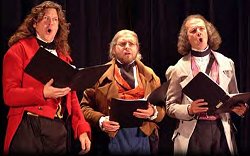|
Editor:
Marc Bridle
Webmaster: Len Mullenger
|
Seen and Heard Concert
Review
Christmas
Is Come: Eighteenth Century Dance and West Gallery Music from
The
Mellstock Band Chittlehampton Parish Church,
Devon, 2.12.2005 (BK)
From Left: Charles
Spicer , Dave Townsend and Philip Humphries
Much of it is breezy stuff. It rattles along at brisk tempi, with melodious 'fuging' tunes in which congregations could join following the musicians' lead. Though restricted initially to psalm settings (only 'the word of the Lord' was permitted in services apparently), volumes of hymns were soon written, often to paraphrased settings of biblical texts: the carol 'While Shepherds Watched Their Flocks By Night' for instance, was set to over 150 different tunes. By the time that hymn writers like Isaac Watts and the Wesleys began to provide inspiration for village composers, a new and distinctive English music was most definitely alive and unashamedly kicking.
The concert was typical of
the band's output, a two hour mixture of West Gallery carols,
dance music and readings from Hardy, John Clare, William Barnes
and others. There was even a short Mummer's play in which
'King George' vanquished a 'Turkish Knight' - twice - while
Father Christmas and a doctor spurred him on.
And then there was the humstrum, a genuine novelty to my ear. The Francis Grose 'Dictionary of the Vulgar Tongue' from 1811 describes it as: 'A musical instrument made of a mopstick, a bladder, and some packthread, thence also called a bladder and string, and hurdy gurdy; it is played on like a violin, which is sometimes ludicrously called a humstrum; sometimes, instead of a bladder, a tin canister is used. Though by no means a Stradivarius, I reckon that if carol singers played humstrums today (or sang a quarter as well as the Mellstock Band) the world would be a brighter place and Christmas a far more joyful celebration. As we left the performance I heard several people saying that churches would be full these days if the music could be like this.
The Mellstock website shows where the band will be until December 18th. Go to see them if you possibly can.
Bill Kenny
Picture © Keith Kitson
Back to the Top Back to the Index Page |
| ||
|
||||



